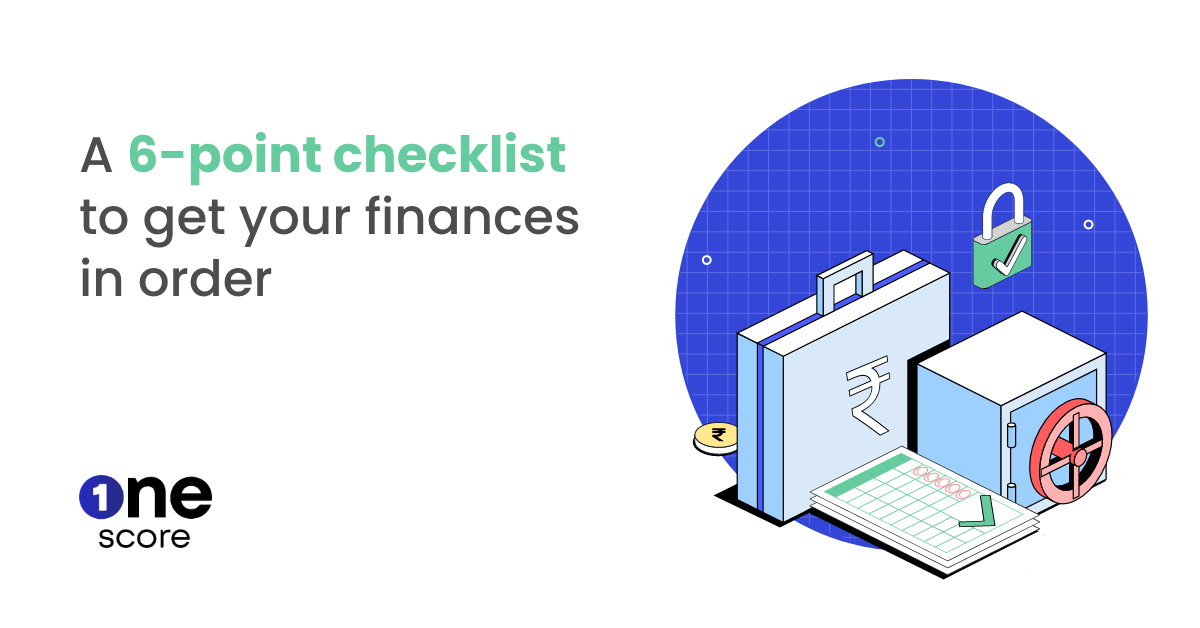Personal Finance Checklist - 6 Tips To Know
Use this personal finance checklist: Follow a budget, build an emergency fund, manage your debt, set your financial goals, and achieve personal finance independence.

Listen to the article here:
Our conditioning plays a crucial role in how we think about our finances. We are often made to believe that our CTC defines our success, but personal finance as the term suggests is deeply personal.
Meeting your goals defines your success better than any societal stamp of approval. To ensure that lack of money doesn’t become a hurdle in achieving your goals, it’s important to cover your bases while walking towards newer milestones.
6 Tips to Create a Personal Finance Checklist
1. Learn about taxes
You may find tax-planning daunting as a beginner, but it becomes easy once you set a financial plan in motion.
● Identify which tax slab you belong to
● Find out your taxable income & deductions
● Explore tax-saving instruments such as PPF, ELSS MF, and insurance
● Check out the retirement & pension schemes provided by your employer
If you find the process intimidating, there are various online platforms that can help you with tax planning. But, do educate yourself and take charge eventually.
Also read: Income tax slabs update: Budget 2023-24
2. Stick to a budget
Budgeting not only helps you save money but also keeps your finances aligned with your goals.
If you don’t know where to begin, you can follow the simple budgeting strategy of 50-30-20.
Split your post-tax income into :
● 50% for needs
● 30% for wants
● 20% savings & investments
Please note that you can adjust the ratio to suit your lifestyle better, the point is to keep tabs on your money.
Did you know that your credit card can also help plan and follow a budget? It’s easy to keep track of expenses and cash flows with a credit card. You can also use it for your planned expenses and earn reward points by paying your bills on a credit card.
3. Maintain a healthy credit score
Credit cards don’t just help you track your expenses but are also required to build a credit score. Your credit score defines your creditworthiness, that is, your ability to pay back a borrowed sum.
Once you start getting a stable income, you work towards bigger goals like buying a house, travelling the world, or planning a family. Some of these might require you to take a loan, in which your credit score acts as your character certificate.
Also read: How to Maintain a Good Credit Score?
If you are looking to buy a credit card, check out One Credit Card easy to manage & track, and promises exciting rewards.
4. Plan your savings & investments
Ensure that you put at least 20% of your salary towards savings & investments. It would not only secure your future but also eliminate financial anxiety.
Savings help you fulfill your short-term goals and also act as a safety net. Investments look after your long-term goals like retirement and financial freedom. Most importantly, investments create a hedge against inflation.
5. Have an emergency fund
It is a type of savings you set aside for unplanned expenses & emergencies. In the events like job loss or medical emergencies, you may run short of funds. Therefore, putting aside money for 3-6 months of fixed expenses can save you from burning out in testing times.
Always be prepared for any surprises life may throw at you, especially the ones that involve finances.
6. Get a health insurance
Most Indians are ill-prepared in terms of finances when it comes to health emergencies. A surprising number of people lose their life savings to it.
Getting health insurance at an early stage can get you low premiums and maximum coverage. If you have dependents such as parents, children, or a non-working spouse, you must also get term insurance.
Learning to plan your finances is crucial to living the life of your dreams, and so is having access to credit. Ensure that you always stay in charge of your credit score by managing your credit accounts on OneScore, Download now.
FAQs
-
What is personal finance?
Personal finance is about making smart and responsible choices about your money. Making a financial plan that aligns with your goals and financial obligations gives you peace of mind.
-
What are the five key aspects of personal finance?
Personal finance is all about being financially capable of achieving your goals. Saving, investing, tax-planning, retirement planning, and having an emergency fund are crucial while planning your finances.
-
What are the six steps to having a financial plan?
Following are the fundamental steps for making a perfect financial plan:
- Learn about taxes
- Stick to a budget
- Maintain a healthy credit score
- Plan your savings & investments
- Have an emergency fund
- Get health insurance
**Disclaimer: The information provided on this webpage does not, and is not intended to, constitute any kind of advice; instead, all the information available here is for general informational purposes only. FPL Consumer Services Private Limited and the author shall not be responsible for any direct/indirect/damages/loss incurred by the reader in making any decision based on the contents and information. Please consult your advisor before making any decision.
- OneScore , November 23, 2022

